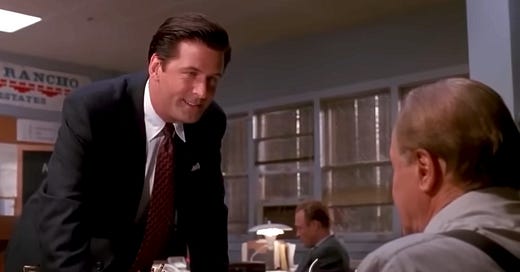
“PUT that coffee down,” Alec Baldwin commands, impeccable, Armani suited, imperiously coiffed as he eviscerates a clutch of failing salesmen in a dismal Chicago real estate office. “Coffee is for closers….” Remember the scene? Baldwin’s sneering incisiveness is pure David Mamet, a pivotal moment in his 1984 masterwork Glengarry Glen Ross, which, as I was surprised to learn this week, still retains its ability to raise my blood pressure and break my heart. Daddy issues. He’s the ice-blooded embodiment of the culture’s cocksure masculine devastation that has wrecked havoc through several generations. And if you’re an artist, he’s the antichrist, which would be fine, if only he would shut up and stay in Chicago.
I’ve been imagining Mamet at work on that scene, hunched over a notepad snapping pencil tips, doing lord knows what to his adrenals as Baldwin hovers nearby, contemptuous, checking his Rolex. If it was like that, I hope Mamet had beckoned to this inner Baldwin, had let him into the room as his muse, then sent him off again when the work day was done. I hope Mamet sighed and stretched and spent some time in deep restoration. Let’s hope it was all a choice.
However, from what I see in my practice supporting other writers and artists, there’s an army of rogue Baldwins out there, shoving their way into every scene. Can you imagine? These cocksure smart guys driving their fucking BMWs over from corporate to tell you your fucking job? They might linger in the half-light, just at the edge of your circle of consciousness, cracking wise as you work, or they may be right there at center stage, barking, issuing threats. “You can’t close the leads? You can’t do shit? You are shit,” as Baldwin explains in Glengarry Glen Ross. “Hit the bricks, pal, and beat it, because you are going out.” (It always ends that way, doesn’t it? With the threat of a life under the overpass.) Striving away under these conditions might even make you great, for a while, for better and for much, much worse. And yet, sooner or later, if you’re not selling derelict lots in a half-baked development project, this toxic technique, this method of fueling your work with emotional violence and belittlement, thankfully, stops working.
And unless you are actually Mamet, you probably don’t want a zombie Baldwin crashing through your imagination in the first place. You’re penning a pivotal love scene and here comes a bellowing Baldwin. You’re pouring the depths of your soul into the melody of a new song, drawing a strange and beautiful new suite of sketches or writing about your tenderest childhood memories, and here comes Baldwin on a tear, hint of a smile as he disparages your talent. Mr. Baldwin, will you please return to your trailer? This isn’t your scene.
Still, I promise, developing a witnessing consciousness that can re-direct your inner Baldwin and tap into his power, while coming into sovereignty as you create a safely thrilling process for your practice, is one of the deep delights of working with your creativity. It’s one of the gifts of going further with your practice, beyond the obvious.





Jessica - thank you for this wonderfully written reflection and for offering a means for people to find refuge and liberation from "the culture's cocksure masculine devastation."